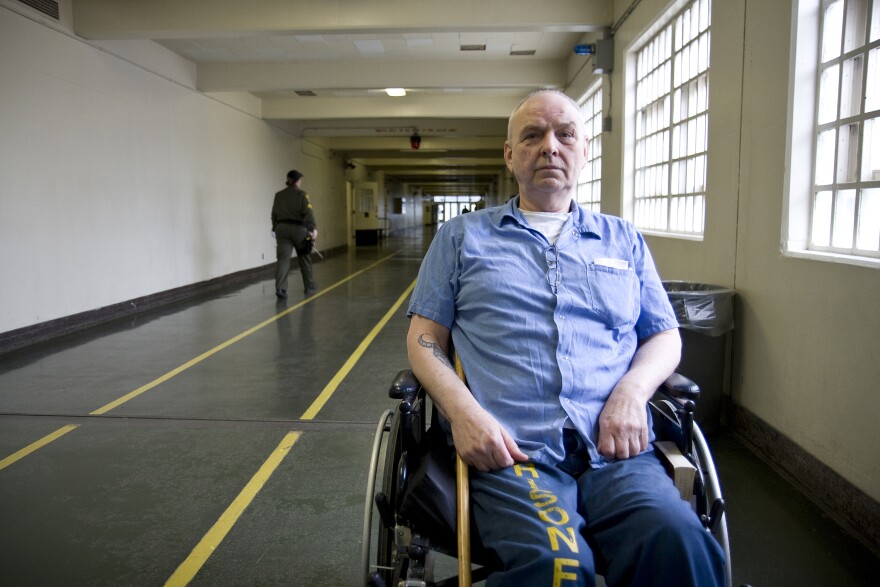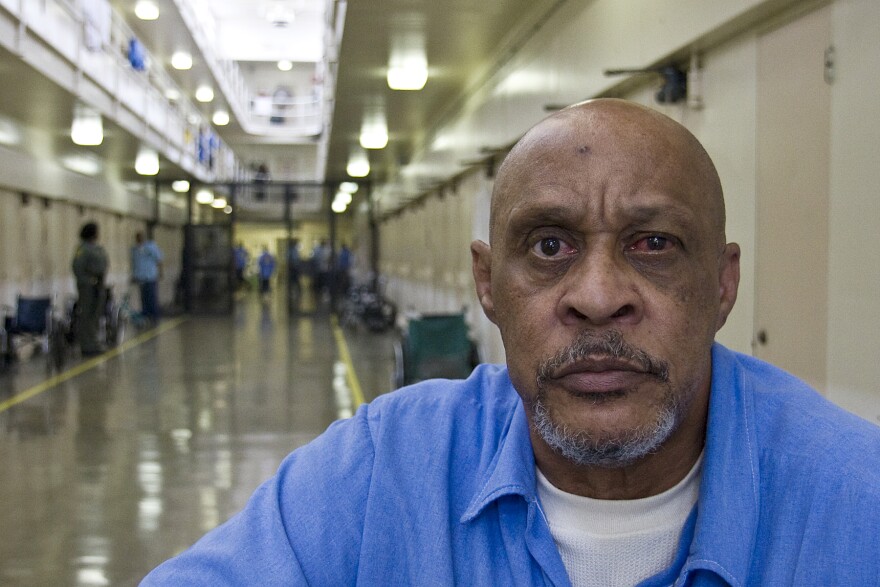1 of 15
A cell block in the California Medical Facility (CMF) in Vacaville, one of the state’s 33 prisons. It has the largest prison hospital and houses California’s oldest and sickest inmates. General population inmates are also at CMF to help staff the prison.
Angela Carone
2 of 15
Jerry Wade, 63, has been in prison for 38 years, serving a life sentence for murder with no chance of parole. California prison inmates over the age of 55 have doubled in the past 10 years. The number of male prisoners over 60 will triple in the next eight years.
Angela Carone
3 of 15
Jimmy Reece, 65, has just had cataract surgery. He is serving a life sentence for murder.
Angela Carone
4 of 15
A prisoner in a wheelchair moves through the halls, a common sight at the California Medical Facility at Vacaville.
Angela Carone
5 of 15
A wheelchair sits outside a prisoner's cell because the doors are too narrow for it to fit inside.
Angela Carone
6 of 15
A bed and personal belongings fill the cell of a prisoner who recently had a stroke and now walks with a cane. In state prisons without a medical facility, bunk beds can be an issue for sick and elderly prisoners.
Angela Carone
7 of 15
A wheelchair-bound prisoner pulls a laundry cart through the prison corridor known as the mainline. Some handicapped prisoners still work within the prison.
Angela Carone
8 of 15
Two inmates walk together through the facility assisted by a walker and a cane.
Angela Carone
9 of 15
A sick prisoner sleeps in the hospital unit at the California Medical Facility in Vacaville.
Angela Carone
10 of 15
Richard Lauranzano, 62, stands in the prison lunch room. He is serving a 50-year sentence for seven counts of sexual offenses against children and murder. He is currently being treated for a heart condition and was treated in prison for stage four, non-Hodgkin’s lymphoma. His cancer is now in remission.
Angela Carone
11 of 15
Antonio Sullivan, 71, is a "three striker" serving a sentence of 25 years to life. One reason cited for the growing numbers of elderly inmates is California's 1994 enactment of the three strikes law. The law says that a third felony conviction brings a prison sentence of 25 years to life, with no guarantee for parole.
Angela Carone
12 of 15
Sullivan holds a crumpled, torn document indicating a DUI conviction. According to Sullivan, the DUI was his third strike, resulting in a sentence of 25 years to life. He says he served six years for murder in the 1960s, and a second sentence of 18 months for assault. Documents from the Department of Corrections indicate his third strike was a "DUI/Bodily Injury" conviction. Sullivan says he'll be dead before he's eligible for parole.
Angela Carone
13 of 15
Inmate Brian Long is dying of prostate cancer and will likely spend his remaining days in the hospice unit, where an attempt is made to humanize the rooms. Shutters are placed over barred windows, pictures hung on the walls, and a small, television set is made available. The quilt on his bed is one of many donated by Shepherd of The Hills Lutheran Church in Vacaville. These quilts are made by a group of elderly women for the inmates in hospice care.
Angela Carone
14 of 15
Inmate Brian Long writes a letter to his sister.
Angela Carone
15 of 15
Brian Long, 51, is serving an 11-year sentence for "annoying/molesting a child" and has a prior conviction of having sex with a minor. Long is expected to die in the next three months and has applied for compassionate release. In 2009, there were 57 applications for discharge under compassionate release and three were granted.
Angela Carone
To anyone approaching the gates, the California Medical Facility (CMF) in Vacaville looks like your average prison. It is surrounded by cyclone, barbed wire fencing monitored by guards and a watch tower. But once inside, it becomes clear this prison population is different. In a waiting area, four elderly men sit in wheelchairs; one is slumped over sleeping. It could be a scene from a typical nursing home, if it weren't for the prison jumpsuits the men are wearing. Other prisoners move throughout the building in wheelchairs and use canes. Some look weak and shuffle slowly down the corridor.
CMF is the primary location for delivering heath care services to elderly and sick prisoners in the California prison system. The prison has a medical unit and a 17-bed, state-licensed hospice. As the elderly inmate population continues to grow, due to determinate sentencing and three strike laws, so too have the health care needs of California's incarcerated. Last year, it cost the state $1.9 billion to provide health care to the prison population, which is almost 20 percent of the entire corrections budget.
The Project Envision documentary, "Life in Prison," will air Jan. 25 at 9 p. m. on KPBS Television.






















